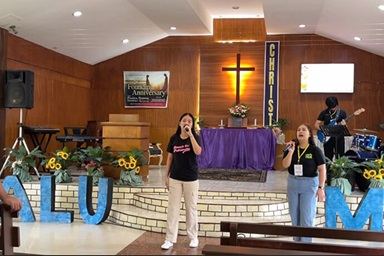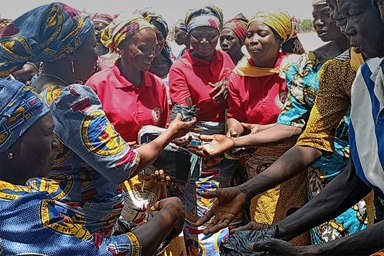Key Points:
- The Wesleyan University-Philippines Hospital initiative will provide a safe space for treatment and counseling.
- Hospital administrator John Cesar R. Sabas said having an HIV hub in the United Methodist-related hospital gives easier access for people in the community to learn about their HIV status.
- Representing the Center for Health and Hope, the Rev. Donald E. Messer said that church members can help fight the stigma surrounding HIV and AIDS.
Wesleyan University-Philippines Hospital has dedicated a hub designed to provide care and support for individuals living with HIV, offering them a safe space for treatment and counseling.
United Methodist bishops and members of the board of trustees dedicated the HIV and AIDS Hub in Cabanatuan City on July 8.
“The HIV/AIDS hub stands as a powerful testament to our dedication to the ministry of healing and compassion of Christ, particularly to the sick and the suffering,” said Bishop Ruby-Nell M. Estrella of the Manila Area. “It also exemplifies what we can achieve together in serving the most vulnerable members of our society.”
Irineo G. Alvaro Jr., president of the United Methodist university, said the effort is significant.
“Foremost is that having an HIV hub helps address the existing stigma or the fear of it. AIDS victims shall be embraced, not to be driven away or be feared or to evade; they need our embrace more than our fear,” Alvaro said.
Bishop Rodel M. Acdal of the Baguio Area commended the initiative.
“Not all hospitals have a hub for people living with HIV and AIDS (with a) very holistic scope in addressing the need of the community,” he said. “I am very proud to have Wesleyan University-Philippines Hospital upholding high engagement, not just to the patients but (also) to the community as a whole with which we can extend our help.”
The dedicated hub received seed money of $833 from the HIV and AIDS National Forum held in March in the Philippines. A joint initiative of the hospital, John Wesley Academy and Critical Thinking Center and the Center for Health and Hope, the conference was themed “Empowering Lives: Bridging Hope Through Compassionate Care” and drew more than 600 participants.
The forum was sponsored by the United Methodist Global AIDS Committee and a grant from Moody United Methodist Church in Galveston, Texas, demonstrating global support for the university’s initiatives.
Wesleyan University-Philippines emphasizes Wesleyan spirituality. It has demonstrated community support and launched a series of initiatives to aid the sick, the poor and survivors of disasters.
During the forum, Alvaro commended United Methodists for holding the timely conference, noting that HIV infections are increasing in the Philippines at an alarming rate of 411% since 2012.
Dr. Hector Santos, president of the Philippines Medical Society, called on “collaboration of all sections of society to become engaged,” saying medical people “cannot stop the HIV epidemic alone.”
Representing the Center for Health and Hope, the Rev. Donald E. Messer stressed that church people must face both “AIDS and AFRAIDS, since stigma still kills and Christians too often are fearful and discriminatory.”
Subscribe to our
e-newsletter
Messer, a United Methodist, serves as executive director of the Center for Health and Hope, which he founded to support and advocate for persons infected and affected by HIV and AIDS around the world. There have been several partnerships between the Center for Health and Hope, John Wesley Academy and Critical Thinking Center and Wesleyan University-Philippines.
Dr. Glenn Roy Paraso, a United Methodist lay leader, serves as a consultant to Wesleyan University-Philippines Hospital.
“The mission of AIDS response and treatment is one that heals and transforms body, mind and spirit,” he said. “It is the Wesleyan way. It is how we should respond in The United Methodist Church, healing the connection. (The hub) will increase coverage and credentials for accrediting treatment and standards.”
Bishop Israel M. Painit of the Davao Area said that the hospital’s HIV hub plays a crucial role in providing comprehensive care for patients living with HIV.
“I am proud,” he said, “that we can now serve as a central point for accessing specialized medical treatment, counseling and support services, ensuring patients receive holistic and coordinated care. This integrated approach improves health outcomes and enhances the quality of life.”
Hospital administrator John Cesar R. Sabas said having an HIV hub in the hospital gives easier access for people in the community to learn about their HIV status.
“And it will pave the way for people living with HIV to access free HIV treatment,” he said.
Juanito Carlos Jr., chair of the board of trustees, said the hub serves those in need while also serving Christ.
“It is our joy to initiate this program, an opportunity for us to be a conduit for serving our sick and needy fellow people. By doing this, we are, in effect, serving people. We are willing to be an arm or a conduit of our Lord to continue serving him,” he said.
Mangiduyos is a communicator in the Philippines.
News media contact: Julie Dwyer at newsdesk@umnews.org. To read more United Methodist news, subscribe to the free Daily or Weekly digests.




